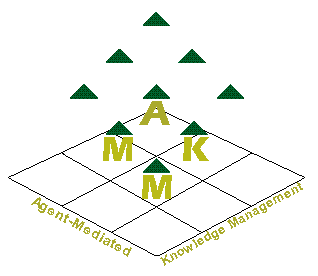| Author/Presenter |
Title
+ Link2Abstract |
Slides |
Pictures |
| J. M. Dodero, S.
Arroyo, V. R. Benjamins |
Dynamic
Generation of Agent Communities from Distributed Production and
Content-driven Delivery of Knowledge
|
AMKM03_arroyo.pdf
|
1 2
|
| W.F. Lawless |
Information
Density Functional Theory (IDFT): A quantum approach to knowledge
fusion and organizational mergers |
lawless_aaai_s03_amkm.ppt
|
1
|
| J. J. Vasco Furtado,
V. Ponte Machado |
Improving
Organizational Memory through Agents for Knowledge Discovery in Database |
Furtado.ppt
|
1
|
| K. Hui, S. Chalmers, P. Gray, A. Preece |
Experience in using
RDF in Agent-mediated Knowledge Architectures
|
gray.ppt
|
1
|
|
J. A.
Pinto de
Magalhães, C. J. Pereira de Lucena |
Using an
Agent-Based Framework and Separation of Concerns for the Generation of
Document Classification Tools |
Presentation_Magalhaes.ppt
|
1
|
| J. Louçã |
Modeling
context-aware distributed knowledge |
Louca_SanFrancisco2.pdf
|
1
|
| J. Novak, M. Wurst,
M. Schneider, M. Fleischmann, W. Strauss |
Discovering,
visualizing and sharing knowledge through personalized learning
knowledge maps – an agent-based approach
|
amkm_novak_wurst.pdf
|
1
|
| D. A. Evans,G.
Grefenstette, Y. Qu, J. Shanahan, V. Sheftel |
Agentized,
Contextualized Filters for Information Management
|
AAAI-03
ViviDocs Final Slides.pdf
|
1
|
|
Breakout Sessions
|
|
1 2 3
4 5 6
7 8 9
|
|
Coffee Break
|
|
1
|
| T.-D. Cao, F.
Gandon |
Integrating
external sources in a corporate semantic web managed by a multi-agent
system |
AMKM_2003_V02.ppt
|
1
|
| W. Krueger,
J. Nilsson, T.
Oates, T.
Finin |
Automatically
Generated DAML Markup for Semistructured Documents
|
AMKM_krueger_nilsson.ppt
|
1 2
|
| M. Ehrig, C. Schmitz, S. Staab, J. Tane, C. Tempich |
Towards
Evaluation of Peer-to-Peer-based Distributed Knowledge Management
Systems |
AMKM2003_Tempich_AIFB_Karlsruhe.ppt
|
1
|
| K. Rawlins, C. Eliot, V. Lesser, B. Woolf, Peter Cassin |
Ontology
extraction for educational knowledge bases |
|
1
|
| S. Toivonen,
H. Helin |
Representing
Interaction Protocols in DAML
|
ip_big.pdf
ip_small.pdf
|
1
|
A. Pease
|
AMKM at the Plenary Session
|
Plenary session.ppt
|
1 2 3
|
|
Informal Meeting at the Gordon
Biersch, Palo Alto
|
|
1 2 3
4
|



